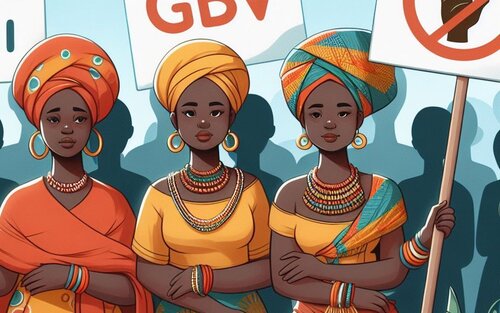Getting Help after Experiencing Gender-Based-Violence
Women and girls with disabilities are most likely to experience some form of gender-based violence due to their vulnerabilities. Women and girls with psychosocial and intellectual disabilities and children with disabilities are at the most risk.

Gender Based Violence (Bing's Co-pilot)
Get Help after Experiencing Gender-Based-Violence
Some of the contributing factors to gender-based violence (GBV)and its prevalence include:
- Lack of awareness on what GBV is - some women experience GBV but they are not aware that it’s GBV and so they can’t report it.
- Poverty - some women with disabilities live in poverty and they choose to stay with the perpetrators because they have no other option.
- Communication barriers - for non-speaking autistics and the deaf, not being able to speak makes them an easy target and most of the offenders are close family members, caregivers or people who are close to them.
Where to Seek Help after Experiencing GBV
Getting help after experiencing GBV is the first step in the fight against the vice. There may be different places where one may choose to get help depending on personal preference, but for professional advice, these are some of the avenues to engage when seeking help.
1. Emergency Support
The emergency support numbers highlighted below are in operation. There may be other emergency support numbers that are not yet included here. Calling the numbers, you will be able to get assistance, however, most of them are not text message friendly. They either take too long to respond or they don’t respond at all. Not all of them deal specifically with GBV cases, but they will offer assistance.
-
Kenya red cross counselling 1199
-
Healthcare Assistance KENYA 1195
-
Gender violence recovery Centre 0800720565
-
Coalition on violence against women 0800720553
-
Befrienders Kenya 0722178177
-
Centre for Rights Education and Awareness tool free line 0800720186
-
Centre for Rights Education and Awareness legal and psychosocial support WhatsApp line 0719437286
-
Gender based violence men 1195/1196
-
LVCT for general counselling services 1190
-
Child helpline 116
-
Police 911
-
Health care worker counselling line 0800720608
-
NMS 0800720541
One can also contact the gender-based violence rescue centres directly.
2. GBV Support Organisation
Many of the emergency services shared above belong to GBV support organisations. These organisations can provide counselling, legal aid, shelter, and other forms of support.
Visiting the organisations’ offices if you can will be more fruitful, especially if you are not so sure how to deal with a case or if you feel you may be at risk after reporting a case.
There are also GBV support groups that you can join in your local community. If there’s one, you can access them through your local community health workers.
3. Seek Medical Advice
It is important to go to the hospital to seek medical attention after a GBV experience, especially if it involves any form of physical violence. For women with different disabilities, it may be a challenge getting to the hospital. In this case, calling the emergency numbers above and explaining your situation well, they will see how best to help you.
Being administered by health workers not only protects your health but also helps to document the GBV experience and this can be used as evidence.
4. Report to the Police
Women and girls with disabilities face more barriers to reporting GBV cases. As a result, most cases go unreported, and some of the factors that contribute to this include:
-
Lack of resources to report
-
Inaccessibility to the reporting services or institutions
-
Fear of the outcomes
-
Stigma associated with GBV
Some police stations have gender desks for women to report such cases but others do not. Those that do can be more accommodating to women with disabilities. In some local communities, women are encouraged to report such cases to the local administration leaders such as chiefs, but this approach may have its own shortcomings.
More needs to be done to address the prevalence of GBV against women and girls with disabilities. For example, police officers need to be sensitized on how to handle women and girls with disabilities when they are in need of their services and the stations also need to be accessible. But when one needs to report a GBV case or ask for help, he/she needs to talk to someone they really trust or call any of the above emergency support numbers.
Article by: Emomeri Maryanne
